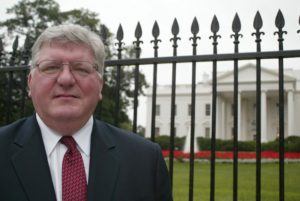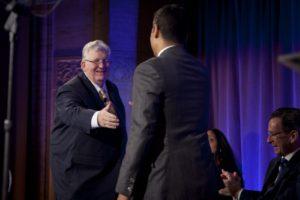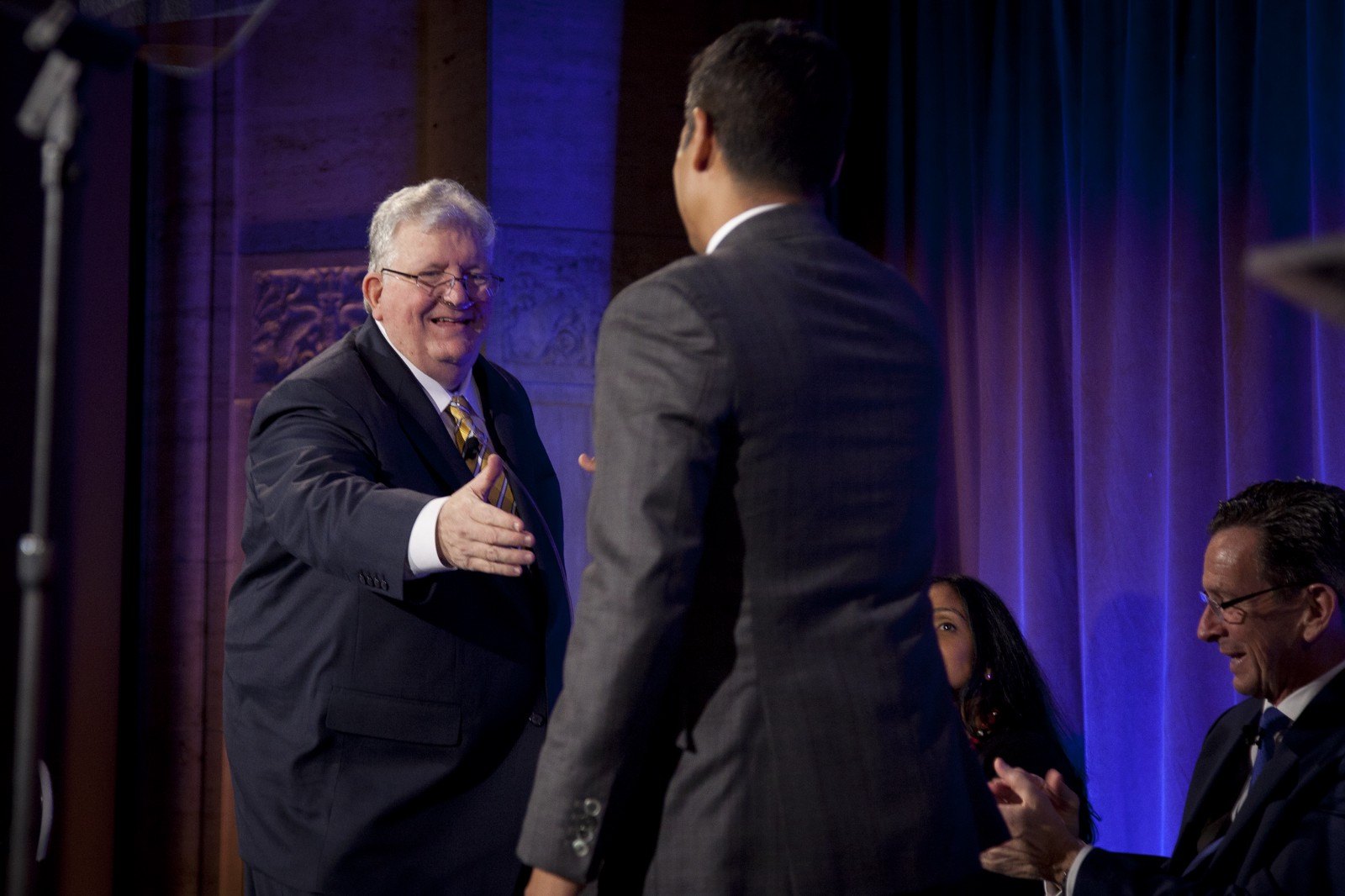Originally published on Medium.com in partnership with Change.org
Pat Nolan is the Director of the American Conservative Union Foundation’s Center for Criminal Justice Reform. For 15 years, Pat served in the California State Assembly, four of those as the Assembly Republican Leader, and was a leader on crime issues, taking a particularly “tough on crime” approach to legislation involving issues such as sentencing.

Nolan’s outlook on prisons and the criminal justice reform system changed after he served 29 months in federal custody after pleading guilty to one count of racketeering due to accepting an illegal campaign contribution. It was an eye opening experience for him, particularly from the standpoint of a conservative, and he launched the ACUF Center for Criminal Justice Reform in 2014 to highlight the skyrocketing costs of prison, fiscal responsibility in the criminal justice system and reforms for non-violent offenders.
The ACUF recently became a partner of Change.org’s ChangeJustice project, which focuses on sharing information from leaders on criminal justice reform. As part of ChangeJustice, ACUF launched a petition calling on the Sentencing Commission to study the impact having an incarcerated parent has on children and families and how these factors could be taken into account with sentencing.
I had a chance to ask Pat a few questions about his experience in prison, the work ACUF is doing, and why conservatives should support criminal justice reform.
Tell me about your time in the California Assembly. As a lawmaker, how did you view criminal justice reform?
I grew up in a tough neighborhood in Los Angeles at 2119 Crenshaw Boulevard. It was what sociologists call “in transition”, but to those of us who lived there it was just plain dangerous. I was mugged several times. The Bank of America half a block up the street on the corner of Washington Boulevard was frequently robbed. At the pharmacy across Washington Boulevard from the bank, the owners, an elderly pharmacist and his wife, were beaten, bound, and gagged by drug addicts seeking a fix. A neighbor who lived six doors down from us was shot dead walking out of 6:30 Mass at our Parish a block and a half away. The criminals who preyed on our neighborhood were color blind; their victims were people of all races. It was a terrible environment for families.
When I got elected to the legislature I wanted to make communities safer for the residents, and I thought that locking up more bad guys for longer stretches was the way to accomplish that. I was a reliable voter for tougher penalties and more prisons. And I was a strong supporter of the rights of victims, whose needs are often overlooked as the gears that the “assembly line” of justice grind on. I received the “Victims Advocate Award” by the Parents of Murdered Children, and was a sponsor of the Victims Bill of Rights.
What shocked you the most about prison? How did prison change your mind about the criminal justice system?
The two biggest shocks of my time in prison were: that very little is done to prepare the inmates for their return to the community, and that prison personnel frequently make it difficult for prisoners to practice their religion.
In the Legislature, prison officials made glowing reports of their many programs to help prisoners leave prison better than they enter. When I made one of my many tours of prisons as a legislator, the officials proudly pointed to their programs. When I went to prison as an inmate I discovered that those programs were merely for show — a Potemkin Village. The reality is that other than GED classes, there are very few programs to provide prisoners life skills and a moral compass. Instead inmates are warehoused, with little to do except watch television and play cards. What few jobs there are consist of little more than a half hour of duties with the rest of the time “looking busy”. Prisoners are beset with the twin curses of boredom and loneliness. Is it any wonder that fights erupt frequently? And, studies show that nonviolent offenders commit more serious crimes because the skills they learn to survive in prison make them more dangerous when they return home.
The difficulty inmates find in attempting to practice their faith stems not from animus to religion by the staff, but by lethargy. It takes more work to check volunteers in through the gate. So, any excuse will do to deny the volunteers credentials, and even if approved they are often turned away at the gate because of a “lack of paperwork”. Now, let me be clear, there are many prison officials who welcome religious volunteers. However, as a legislator I assumed that all prison officials, even atheists would encourage religious programs. But that sadly is not the case.

What kind of work is the American Conservative Union Foundation’s Center for Criminal Justice Reform doing?
The ACUF Center for Criminal Justice Reform works to inform and mobilize public support for criminal justice reforms that are based on conservative principles, and we work with government officials to implement those reforms effectively.
Some of those reforms we advocate:
Reserving costly prison beds for dangerous and repeat offenders, while holding low risk offenders accountable under supervision in the community to keep their families intact, allow them to continue to work, pay taxes and support their families, and participate in drug treatment or receive mental health services if appropriate.
Make every effort to preserve healthy family relationships. Too often offenders are sent to prisons too distant for their families to visit. Most jails and prisons charge exorbitant fees for phone calls from friends and families. All research shows that an intact supportive family is the greatest factor in an offender making a successful transition home after prison.
Establishing drug courts with judges, prosecutors, and defense attorneys who are specialists in drug addiction, and who seek to place offenders in the programs most likely to help them get back on the “straight and narrow”.
Encourage mentors to work with offenders to plan their lives after incarceration, develop their resume, prepare them for a job in the mainstream economy, and meet them at the gate to walk with them in the difficult months after release. These mentors can help them think through their decisions, and point out the moral choices to avoid harming others including their families.
Advocate programs that identify the needs of victims and assist them through the court process and after. We encourage prisons to offer victims’ impact programs so that offenders can understand the harm they have caused their victims. And we support restitution from offenders to help make things right for the harm they have done to their victims.
We work for fair sentencing laws that are tailored for the crimes committed, and that do not do more harm than the underling crime.
We oppose efforts to expand criminal penalties to actions that are morally neutral or even positive. The government has overcriminalized our society to the point that it is estimated that each American commits three felonies a day without even realizing.
What do you think is the most pressing problem we need to solve?
My mentor, Chuck Colson, said, “Only a nation that is rich and stupid would continue to spend billions of dollars on a system that leaves offenders’ characters unchanged, victims’ needs unmet, and communities living in fear of crime.” He succinctly pointed to the most pressing problem facing our criminal justice system: its explosive growth. For most states, prison spending is the second fastest growing budget item after healthcare. For the federal government, the prisons eat up one-third of the entire Justice Department budget, squeezing out funds for counterterrorism, the FBI, and the courts.
The out of pocket costs for the government to run the prison systems is $80 billion each year. But when you factor in lost income, higher public welfare costs, and other expenses related to criminal justice, the impact on the economy exceeds $1 trillion annually!
Wasting taxpayer money to lock up people who pose no danger to the community makes no sense.
We certainly need prisons for people who are threats to public safety. But there are a lot of folks in prison today that we’re simply mad at. They’ve broken the rules, but we’re not truly afraid of them.
Despite polls showing bipartisan support for reform, the issue is often viewed with a left vs. right lens. What message do you want to get across to Republican voters?
To my friends on the Right I would say that it is not conservative to support a huge bureaucracy that is expensive and fails over 40% of the time. But even more the system destroys families, and limits the honest jobs available for offenders. That cost is too much for very little public safety.
For those on the Left I would ask them to stop spouting the nonsense that conservatives only support reforms because they save money. Of course, many reforms do save money, but the more important motivation for conservatives is their fear that government is intruding into too many areas of our lives, and that its powers should be limited. They also see inmates are children of God, and their dignity should be respected. That is why conservatives supported the Prison Rape Elimination Act, the Second Chance Act, and the Fair Sentencing Act. Those bills didn’t save money. They were simply the moral thing to do, and I am proud that conservative leaders spoke out forcefully in support of each of them.
